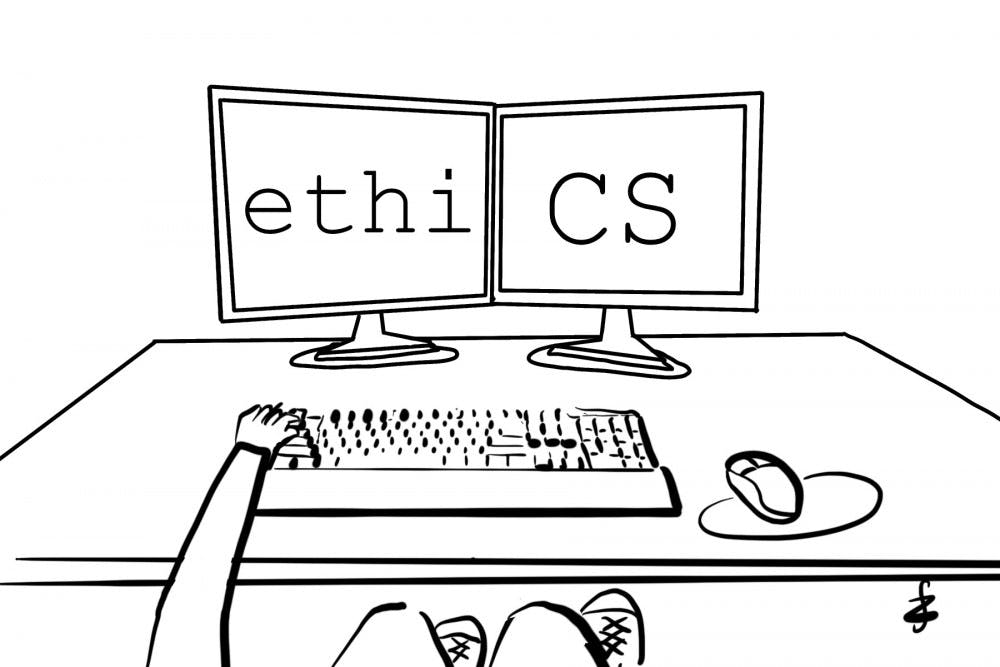Last spring, the Department of Computer Science announced the inaugural hiring of 10 Ethics Teaching Assistants, who will develop and deliver curricula around ethics and society in five of the department’s largest courses.
The department created the ETA program to acknowledge the impact that the products and services created by computer scientists have on society, said Professor of Computer Science and Department Chair Ugur Cetintemel. Cetintemel, who helped spearhead the program, said that it was important for concentrators to think critically about the usage and possible misuse of the solutions they build. “We want our concentrators to think about the ethical and societal implications of what they do, not as an afterthought but as another fundamental dimension they should consider as they develop their work,” he said.
Besides developing ethics modules, ETAs will organize ethics lectures with high-profile speakers, set up workshops and compile readings for students to utilize. ETAs will not hold TA hours or grade material like other undergraduate CS TAs, according to Jessica Dai ’21, one of two head ETAs. Two ETAs will work on each of the five CS courses in the program this semester — CSCI 0150: “Introduction to Object-Oriented Programming and Computer Science,” CSCI 0170: “Computer Science: An Integrated Introduction,” CSCI 0111: “Computing Foundations: Data,” CSCI 0130: “User Interfaces and User Experience” and CSCI 1470: “Deep Learning.”
The CS department is already incoorporating ethics into its curriculum through multiple courses such as CSCI 1951I: “CS for Social Change,” but the department hopes ETAs will encourage students to view the topic as a more fundamental aspect of CS.
“What we realized was that while it’s important to have these exclusively dedicated courses for these topics, this is not sufficient because sometimes students take these courses and think that they’re done,” Cetintemel said. “We wanted to avoid the checkbox mentality.”
Cetintemel emphasized how the curricula being developed by ETAs will seamlessly fit the specific needs and structure of a class. “What we are doing is not coming up with a standard way of covering this material,” Cetintemel said. “We want the different courses’ staff to own this material, and that’s the only way it’s going to succeed in the long term.”
All ETAs are CS concentrators, but most are also double concentrating in non-tech adjacent fields, such as philosophy and modern culture and media. Cetintemel said that the department looked specifically for students from multidisciplinary backgrounds who already had expertise in ethics and social impact. Hiring ETAs from diverse academic backgrounds was a part of the CS department’s larger goal to strengthen collaboration and partnership with the humanities.
Over the summer and during TA training, ETAs worked on ethics material to integrate into courses.
Andrew Rickert ’21, an ETA for CSCI 0130, is currently developing modules on human and AI interaction. Rickert said that the curriculum stresses how designers should let users know how their information is being used so that the process is not entirely hidden from consumers.
As part of her role, Dai is creating an exercise for CSCI 1470 that addresses biases of deep learning.
“I thought that this program would be meaningful in the impact it would have on students,” Dai said. “Not everyone is going to a random (ethics) event that a student group holds,” but students will consistently work with the material ETAs develop.
Dai expressed concern that ETAs may be perceived as forwarding a certain vision of what it means to be ethical. She emphasized that the ETAs will not act as “ethics police deciding what is ethical and unethical.”
Associate Professor of Computer Science Tom Doeppner said that ETAs will be paid an hourly wage consistent with other UTAs. The department recently announced an increase in the base hourly wage from $10.60 to $11.66 per hour and an increase from an additional $0.20 to $0.22 per hour for every semester TAed before.
Going forward, Cetintemel hopes to expand the program to more classes and to involve departments such as the Program in Science, Technology and Society and Modern Culture and Media.
Since this is the first semester of the program, Cetintemel said the department is still working on figuring out the goals and metrics to evaluate knowledge on ethical topics. “We need to figure out what it means for CS students to learn and internalize these topics.”





